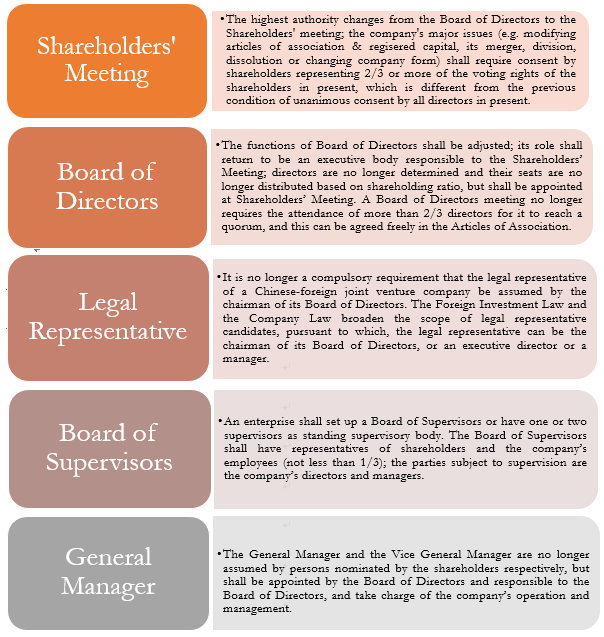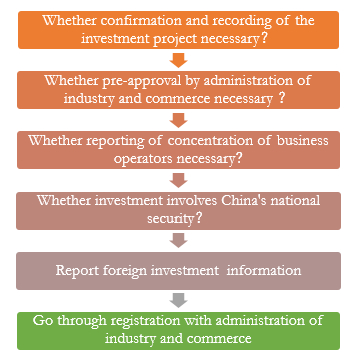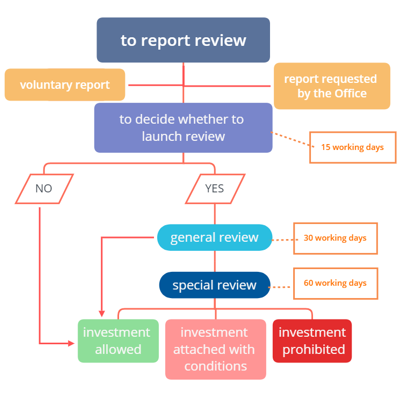Practical Guidelines for Enterprises under China’s New Foreign Investment Regime
The implementation of the Foreign Investment Law of China makes business environment freer and more convenient for foreign-funded enterprises in China. The new law not only encourages the existing foreign-funded enterprises to continue their operation in China, but also attracts more green-field foreign investment into China. Despite the severe negative impact of the Covid-19 pandemic, the new foreign investment regime still made a good start. Statistics released by the Ministry of Commerce of China recently shows China’s achievement in attracting foreign investment in 2020, i.e. the actual use of foreign investment reached a record high of RMB 999.98 billion, up by 6.2% year on year.[1] The year 2020 alone saw the establishment of 51,000 new foreign-funded enterprises.[2]
In this article we will sort out the applicable laws and regulations under the new foreign investment regime with an executive summary in line with our practical experience in the past year since the enactment of the Foreign Investment Law of China, which hopefully serves as practical guidelines to foreign investors who already have investment in China or are seeking investment opportunities in China to facilitate their business development.
Under the new foreign investment regime, the key issue facing foreign-funded enterprises in China incorporated under the old regime, i.e. Chinese-foreign Equity Joint Venture Law, Wholly Foreign-owned Enterprise Law, and Chinese-foreign Cooperative Joint Venture Law of China, is how to adjust corporate governance to meet the new compliance requirements. There is a five-year transition period available to foreign-funded enterprises set up pursuant to the aforesaid three old laws. These enterprises shall, among others, adjust their organizational forms and management bodies within the said transition period in accordance with the Company Law and the Partnership Law. The transition period is offered not only considering the necessities for modifying the articles of association and investment contracts and for handling relevant modification formalities by these enterprises. A more important factor is to give ampler time to the shareholders of existing foreign-funded enterprises for them to negotiate and determine future equity structure and arrangement pattern. Chinese and foreign investors of these enterprises shall make full use of such transition period to optimize their internal corporate governance.
Organization structure
A foreign-funded enterprise with limited liability shall adjust its articles of association and reform its organizational structure in accordance with the Company Law in the following suggested areas:

△Chart 1 – Governance Structure of Limited Liability Company
Arrangement on shareholders’ rights and interests
The new foreign investment regime gives shareholders of foreign-funded enterprises greater autonomy in arranging their property rights and interests. Chinese and foreign investors may re-negotiate these arrangements in accordance with their core values and demands.
For example, as far as profit distribution is concerned, it is no longer a must for a Chinese-foreign equity joint venture that its profit be distributed proportionate to the respective contribution to the registered capital, and a different profit distribution method can be negotiated and agreed freely among shareholders.
As for share transfer, the transfer of shares by any shareholder of a limited liability company to a non-shareholder party does not require the consent of all the other shareholders, but only requires the consent of more than half of the other shareholders. What is more, the articles of association of the company may provide otherwise in this regard.
Time limit for compliance
Although foreign-funded enterprises incorporated under the old regime have five years within which to adjust organization form, organization structure and go through modification formalities with the relevant government agencies, we would suggest that the adjustment and modification work should be carried out as soon as possible. According to our experience, when handling the modification of human resources, some local administrations for market regulation may request that foreign-funded enterprises shall firstly have their articles of association modified. Given the relatively long time required for re-negotiating and adjusting articles of association, to avoid unfavorable effect on company operation, we would suggest that foreign-funded enterprises shall spare sufficient time for re-negotiating their articles of association or joint venture contracts in order to fulfill the compliance adjustment requirement at an earliest possible date.
It is worthy of noticing that December 31, 2024 is the deadline for compliance adjustment by the existing foreign-funded enterprises. This means that for any enterprises whose organizational form and organizational body do not comply with the compulsory requirement of the Company Law or the Partnership Law, and who have failed to apply for modification registration and filing of articles of association or directors for archive, then as of 1 January 2025 the administrations for market regulation will not allow their application for modification registration or filing for archive of other registration items. It can be foreseen that this will leave severe adverse impact on the foreign investors’ investment in China.
Unlike foreign investors who already have investment in China and thus now face company governance issue, for new foreign investors who are preparing for investment in China, they will concern more with the procedures for setting up a foreign-funded company under the new regime. Overall, the administrative procedures regulating foreign investment in China have been simplified. Nevertheless, there may still be a number of reviews, among which, the negative list and national security review are two fields specially targeted at foreign investment; whereas confirmation of investment project, pre-approval by administration of industry and commerce and reporting of concentration of business operators are areas where both domestic and foreign funded enterprises are subject to.
In the following paragraphs we will introduce the procedures for establishing a foreign-funded enterprise under the new foreign investment regime.

△Chart 2 – Flowchart of Incorporation of a Foreign-funded Enterprise
To check whether the investment area of the enterprise to be stablished is on the Negative List
Under the new investment regime, the Negative List for the access of foreign investment is applicable. Any foreign-funded enterprise proposed to be set up shall check whether the investment area is on the Special Administrative Measures (Negative List) for the Access of Foreign Investment (2020). For prohibitive investment areas, no foreign investment is allowed, and for restrictive investment areas, the ownership requirements, requirements for senior executives, and other special administrative measures for the access of foreign investment shall be met by foreign investors.
To check whether the investment requires to go through investment project confirmation and recording
Article 29 of the Foreign Investment Law provides where any foreign investment needs to undergo the confirmation or recording of investment projects, the relevant provisions issued by the State shall apply. As per the Catalogue of Investment Projects Subject to Government Confirmation (2016) and the Administrative Measures for the Confirmation and Recording of Foreign-Funded Projects, projects that require confirmation or recording include the following:
a. Restrictive investment projects on the Negative List, of which projects with a total investment below USD300 million shall be confirmed by governments at provincial level, and those above USD300 million shall be confirmed by the department under the State Council in charge of investment;
b. Investment projects with a total investment (including increase in investment) of USD2 billion and above shall be reported to the State Council for recording;
c. For investment projects under the Catalogue of Industries for Encouraging Foreign Investment (2020) which require the Chinese party to be the controlling shareholder, projects with a total investment below USD300 million shall be confirmed by local governments, and those with a total investment of USD300 million and above shall be confirmed by the National Development and Reform Commission;
d. Other fixed asset investment projects on the Catalogue of Confirmation, e.g. energy development industry.
To check whether the investment industry requires pre-approval by administration of industry and commerce
Article 30 of the Foreign Investment Law stipulates that in industries and fields where foreign investors need to legally obtain permits for their investment, they shall undergo the relevant licensing formalities according to the law.
Pursuant to the Catalogue of Items Subject to Pre-Examination and Approval on Company Registration (November 2017), securities company, monopolized production and wholesale of tobacco, and profit-making privately-run schools belong to statutory industries which require pre-examination and approval by the administration of industry and commerce before incorporation. Furthermore, the State Council of China also stipulates 28 items subject to pre-examination and approval by the administration of industry and commerce. So investors of the proposed foreign-funded enterprise shall also check the aforesaid Catalogue to see if such pre-examination and approval is required.
To check whether reporting of concentration of business operators is necessary
Pursuant to the Foreign Investment Law, the Anti-monopoly Law, and the Provisions of the State Council on the Standard for Declaration of Concentration of Business Operators (amended in 2018), where foreign investors acquire a Chinese domestic enterprise or participate in concentration of business operators in any other manner, which reaches any of the following declaration threshold, they shall make a declaration to the anti-monopoly law enforcement institution of the State Council beforehand for a review on concentration:
a. The worldwide business volume of all the business operators involved in the concentration exceeds RMB10 billion in the last fiscal year, and the business volume in China of at least two business operators among them exceeds RMB 400million separately in the last fiscal year;
b. The business volume in China of all the business operators involved in the concentration exceeds RMB2 billion in the last fiscal year, and the business volume in China of at least two business operators among them exceeds RMB400 million separately in the last fiscal year.
To check whether foreign investment involves China’s national security
The Measures for the Security Review of Foreign Investment, jointly promulgated by the National Development and Reform Commission and the Ministry of Commerce of China (the “Security Review Measures”), came into force as of 18 January 2021. Pursuant to the Security Review Measures, proposed investment in military and other national defence security related areas shall be subject to security review irrespective of the shareholding ratio to be held by the foreign investor in the proposed foreign-funded enterprise. As to other important areas relevant with national security but not related to national defence security (such as agricultural products, energy and resources, infrastructure, cultural products and services, financial services, etc.), where the foreign investor will obtain actual control in the enterprise invested in, the foreign investor must report and receive a security review. If any foreign investor has no idea whether or not his proposed investment shall be subject to the security review, he shall consult the Office of the Foreign Investment Security Review Working Mechanism (the “Office”).

△Chart3 – Flowchart of National Security Review
In the light of the above statutory requirements, foreign investors preparing to enter into China’s market shall carefully assess the risk associated with China’s national security review. If investment is to be in the important areas related to China’s national security as aforesaid, the investors shall firstly consider whether the investment will result in the foreign parties’ actual control in the enterprise invested in. Then they shall also evaluate the extent to which such investment may affect China’s national security, and in the case of necessity design a standby proposal which mitigates threat to China’s national security. In the meantime, foreign investors shall not be over-concerned with the security review, as it is aimed at preventing and solving potential national security risk, but will not change or in any way affect China’s national policy of further opening up to the world for investment.
To report foreign investment information
The Measures for the Reporting of Foreign Investment Information provides that foreign investors or foreign-funded enterprises shall report investment information to commerce departments through the enterprise registration system and the National Enterprise Credit Information Publicity System. These reports include initial reports, modification reports and annual reports; an initial report shall include the basic information of the enterprise, information on investors and their actual controllers, investment trading information and other information; a foreign-funded enterprise formed in the current year shall submit its annual reports from the year immediately after the year of its formation.
To go through registration with administration of industry and commerce
As a last step post the aforesaid procedures, the newly established foreign-funded enterprise can proceed with company registration with the local administration for market regulation (i.e. company registration authorities), to obtain the business license of enterprise legal person or the business license of partnership enterprise, without the need of applying for approval or recording with the commerce department.
The new foreign investment regime unveils national treatment to foreign investment, which is a good development opportunity to enterprises with foreign investment. While enjoying the benefit accorded by China’s new regime, foreign-funded enterprises in China shall also abide by the laws and norms in their operation in China. As suggested, enterprises formed under the old regime shall conduct an internal review on their compliance status, and adjust their governance structure and equity arrangement within the five-year transition period as soon as possible. For foreign investors planning to invest in China, they shall assess the project comprehensively before the investment and properly design and structure the investment project.
[1] News: “Ministry of Commerce of China: the actual use of foreign investment in 2020 rose 6.2% year on year, a record high”, http://finance.people.com.cn/n1/2021/0120/c1004-32006119.html
[2] http://www.chinanews.com/gn/2021/02-28/9421046.shtml
声明:
本文章仅为交流探讨之目的,不得视为广悦律师事务所或其律师出具的正式法律意见,任何仅依照本文的全部或部分内容而做出的行为及因此带来的后果均由行为人自行负责。




